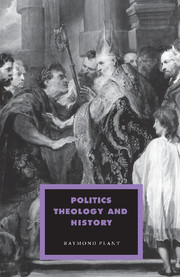Book contents
- Frontmatter
- Contents
- Preface
- 1 Liberal society and political theology
- PART I THE POSSIBILITY OF POLITICAL THEOLOGY
- PART II THE SITE OF POLITICAL THEOLOGY
- PART III LIBERALISM, RELIGION AND SOCIAL UNITY
- Introduction
- 11 Policy and pluralism
- 12 The civil community, the religious community and the unity of society
- Select bibliography
- Index of names
- Index of subjects
- CAMBRIDGE STUDIES IN IDEOLOGY AND RELIGION
12 - The civil community, the religious community and the unity of society
Published online by Cambridge University Press: 23 November 2009
- Frontmatter
- Contents
- Preface
- 1 Liberal society and political theology
- PART I THE POSSIBILITY OF POLITICAL THEOLOGY
- PART II THE SITE OF POLITICAL THEOLOGY
- PART III LIBERALISM, RELIGION AND SOCIAL UNITY
- Introduction
- 11 Policy and pluralism
- 12 The civil community, the religious community and the unity of society
- Select bibliography
- Index of names
- Index of subjects
- CAMBRIDGE STUDIES IN IDEOLOGY AND RELIGION
Summary
Can two walk together, except they are agreed?
(Amos)Concering the problem of arriving at a global ethic, the theologian Hans Küng argues: ‘For today's pluralistic society, ethical consensus means the necessary agreement in fundamental ethical standards which despite all differences of political, social or religious direction can serve as the smallest possible basis for human living and acting together.’
Küng's focus is a global ethics which, in a sense, embodies the issues of this book writ large, but, nevertheless, this point is applicable within societies as well as between them. So, too, is his differentiation between a consensus on a thin morality that limits itself to some fundamental demands and a consensus which, he argues, is not necessary in respect of culturally differentiated thick morality that ‘necessarily contains numerous specific cultural elements’. However, this way of bisecting the moral universe is a very tricky business, as we have seen, but is another reaffirmation of the vexed issue of the relationship between the universal and particular. It is, however, in the context of consensus rather than truth, or a political conception of political morality rather than a metaphysical one, at which Rawls' later thought in Political Liberalism becomes important together with the defence of this later perspective by Richard Rorty. In this later work, Rawls does want to argue that the kind of political order he suggested in A Theory of Justice was, in fact, to be understood against the back-ground of the political culture of Western democratic societies, and that it is misconceived if it is understood to have a universalist or metaphysical message to impart.
- Type
- Chapter
- Information
- Politics, Theology and History , pp. 330 - 359Publisher: Cambridge University PressPrint publication year: 2001



